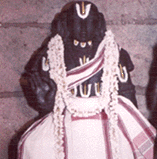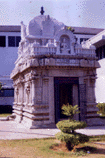The Lord of Tiruvenkatam is very much interested in flower decoration!
Thomala seva [தோமாலை சேவை] is famous in Tirumala temple. In all other temples we might find
Tiruvaradhanam [திருவாராதனம்] mentioned in the daily
poojas; but not in Tirumala temple. Instead,
Thomala seva is mentioned. Because the Lord is so much interested in getting decorated with flowers.
Swami Kurumbaruttha Nambi [குறும்பறுத்த நம்பி] also presented flowers made from clay, to the Lord.
Swami Anantalwan also served the Lord with flowers.
Thomala means
malai [மாலை - garland] hanging from
thol [தோள் -shoulder]. Or
thodukkappatta [தொடுக்கப்பட்ட - assembled]
malai [மாலை - garland] and so
Thomalai. It is believed that
Swami Anantalwan, to whom we are indebted for this
seva, is present as a tree [
magizha maram -மகிழ மரம்] in the garden here. To prove this, every year, Sri Malayappa
Swamy -
Sri Utsavar - arrives twice in this garden. Once on Sri Andal's birthday -
Thiruvadi Pooram [திருவாடி பூரம்]; and again, on the next day of
Theerthavari in
Brahmotsavam. All honours are presented to the tree, believed to be
Swami Anantalwan! Our elders have advised that we should serve the Lord in some form, however small it might be. That way,
Swami Anantalwan was dedicated in his service to the Lord. We can see another thing connected with
Swami Anantalwan, at the entrance to the temple. Today's [4th June 2009] lecture is from the main
gopuram entrance.


At the entrance, inside, on the cieling, we could notice a long crowbar. A board indicates that it is
Swami Anantalwan crowbar!
Swami Anantalwan came earlier, along with his wife and wanteed to establish a garden. For this, he started making a pond to collect water. With crowbar, he dug out earth and asked his wife to throw the mud excavated at a distant place, by carrying it on baskets. She was pregnent and so could not walk fast. Seeing this, the Lord, Who knew that
Swami Anantalwan had come on the orders of
Swami Ramanuja, wanted to help the couple. He also thought, this way, He also would have participated in
Swami Ramanuja's order! The Lord took the form of an young Boy, and approached
Swami Anantalwan and offered to carry mud.
Swami Anantalwan refused, saying that he was carrying out
Swami Ramanuja's order and did not want to share that with others! But the Boy, cleverly approached wife of
Swami Anantalwan, and offered to relieve her strain, by carrying the basket full of mud for some distance. She agreed and gave the basket after bringing it from the digging place to some distance. By this arrangement, the work of throwing mud away, was speeded up!
Swami Anantalwan got doubt and asked his wife how the work was speeded up! The wife told the truth.
Swami Anantalwan got angry and chased the Boy with crowbar in his hand! The Boy ran and entered the temple, and
Swami Anantalwan threw the bar on the Boy and hit Him. Next day as the
garbhagruha was opened,
Archakas saw blood oozing from the chin of the Lord! To prevent blood flowing out
Archakas applied
pacchai karpporam [பச்சை கற்பூரம் - refined camphor] on the Chin of the Lord and this practice is continuing even now! It reminds us
Swami Anantalwan! That crowbar also is displayed at the entrance!
Swami Anantalwan is also regarded as the Father-in-law of the Lord! Once, the Lord and
Sri Thayar were playing in the garden maintained by
Swami Anantalwan! They plucked away many flowers.
Swami Anantalwan was worried as quantity of flowers to be presented to the Lord was getting reduced and so made a special watch! When he found the Divine Couple was plucking flowers, he chased Them! The Lord ran away, but
Sri Thayar was caught.
Swami Anantalwan still cahsed the Lord, Who ran around the temple in
apradhakshinam [அப்ரதக்ஷினம் - anti-clock wise]. To commemorate this incident,
bhagh savari utsavam [भाघ or बाघ ] or back
savari utsavam. In Sanskrit,
bhagh means garden; or, in Hindi, bhag [बाघ] means escape; or, in English, back means reverse order!
Swami Anantalwan has spelt out how a true Sri Vaishnava devotee should be. When he was asked by a devotee, how he should behave, to be a true Vaishnava,
Swami Anantalwan said after keeping the devotee to wait for a long time: '
Kokku pol iruppan, kozhi pol iruppan, uppu pol iruppan, ummai pol iruppan [கொக்கு போல் இருப்பான், கோழி போல் இருப்பான், உப்பு போல் இருப்பான், உம்மைப் போல் இருப்பான்]'! That is, like a
kokku [crane bird] waiting for the proper fish, one should wait for enjoying the Lord only and not in worldly matters. Next, like
kozhi [hen] picking only the food it required from the heap of mud, one should pick the means of reaching the Lord only, in the heaps of
Vedas. Thirdly, like
uppu [salt], when added to water, is invisible to eyes but can be detected by taste, one should be invisible and at the same time serve the Lord. Finally,
ummai pol [like the devotee], one should be patient. These are the qualities of a true
Vaishnava! We will see more of
Swami Anantalwan's services in the coming days; now we move on to
sloka 21:
trividhaṃ narakasyedaṃ dvāraṃ nāśanam ātmanaḥ
kāmaḥ krodhas tathā lobhas tasmād etat trayaṃ tyajet 16.21Discard these Three, advises the Lord.
Tyajet = discard! The Lord says that the Three qualities He was to mention, were the gates for hell, and so should be avoided. Even gate to heaven is to be avoided, as one had to return from heaven after tenure! Gate to
Vaikuntam only should be chosen! We should know these gates to hell to avoid them.
Narakasyedam = to [reach]
naraka [this is not the abode of lord Yama, but
naraka here means the ignorance about the Lord, or lack of efforts to reach the Lord, or the wrong assumptions about the Lord],
trividham = Three types of,
dvaram = gates [are there], for,
atmana = these persons, themselves,
nasanam = to get destroyed. What are those gates?
Kama = lust or desire,
krodha = anger,
tatha = and,
lobha = greed.
Kama ia desire to have sensual pleasures.
Krodha is anger when such desire is prevented or not fulfilled.
Lobha is greed or more lust after enjoying. Today what we witness as terrorism or enemity between countries or economic meltdown, can be traced to these three! We can see in our lives also, how we spent our lives earlier and how we spend now. Now, people want to raise standard of living very fast! This leads to greediness. We compare with others. Everyone wants to be ahead of others. We are not content with what God has provided us. We want to be like others! These Three qualities would erase God from our thoughts and would lead to, worse than hell. These qualities will prevent us from realizing
Brahmam! Tasmat = therefore,
etat trayam = these Three [qualities],
tyajet = are to be discarded.
Swami Anantalwan also said the same in different format to the devotee! We will now depart from this garden.


![[The+Swami+Pushkarini.jpg]](https://blogger.googleusercontent.com/img/b/R29vZ2xl/AVvXsEiX892XzsR3VH_Cb9REsNlQaN2jbgWJMuZGfPZnClShw-7fG5UNOSiBQV1CXasDxxqWEC3FizPuFdil_XWmCorcl4hOxYjkEKZ_dswAee4sKibl3DNt7p00YSgXqwh8eehcdUC4SobHlts/s1600/The+Swami+Pushkarini.jpg)




